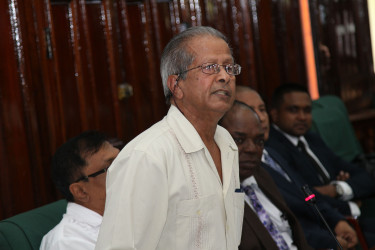Speaker of the National Assembly Barton Scotland yesterday ruled against a request by opposition Member of Parliament and trade unionist Komal Chand for an urgent debate on government’s decision to close the Wales sugar estate.
In keeping with Standing Order 12 of the National Assembly, Chand, the present head of the main sugar union, Guyana Agricultural and General Workers Union (GAWU), asked that the Assembly be adjourned and all business suspended so that the matter of the closure of Wales estate, which he said is of urgent public importance, be debated.
Chand said that the decision will see some 2,000 workers and their families as well as dozens of private cane farmers and thousands who depend on the estate placed on the breadline and will have several ripple effects on other businesses in surrounding communities. According to him, the economic effect of the decision as well as its possible impact on social stability and the drainage and irrigation of several surrounding communities should compel the government to reverse the decision, which he said was contrary to the campaign promises of the APNU+AFC government.

“The workers feel betrayed,” he declared.
The Speaker noted that Chand had complied with all procedures necessary for the submission of the motion. He further noted that the matter was “extraordinary” and required due consideration before explaining that any such request must satisfy three criteria in order to be allowed. These criteria are that they be “definite, urgent and of public importance.”
As stated in Standing Order 12 (2), “the Speaker shall refuse to allow the claim unless he or she is satisfied that the matter is definite, urgent and of public importance and may properly be raised on a motion for the adjournment of the Assembly.”
Though Speaker Scotland found that the matter was definite and of public importance, he disallowed the motion on the grounds that the matter was “not urgent.”
“That the matter is of public importance, there is no doubt,” he said, while adding that there definitely exists room for substantive debate “but the requirement of urgency is not met.”
In response to the ruling, the opposition PPP/C invoked Standing order 12(3), which states, “if the Speaker is so satisfied and either (a) Leave of the Assembly is given; or (b) If it is not given, at least eighteen elected Members rise in their places to support the request, the motion shall stand over until 4.30 p.m. on the same day, and at that time any proceedings on which the Assembly is engaged shall be postponed until the motion for the adjournment is disposed of or until 9.00 p.m., whichever is the earlier. At 9.00 p.m. the motion for the adjournment, if not previously disposed of, shall lapse and the proceedings which have been postponed shall be resumed.”
As all the members of the opposition stood in support of the action, Opposition Chief Whip Gail Teixeira said they did not agree with the Speaker’s definition of urgent. She added that the closure “is not a matter that can be left until December, 2016 to be considered urgent.”
Teixeira, in quoting the Standing Order provision which allows for a debate on a matter though the speaker has ruled to disallow it, also referenced “two instances in recent history.” One of these instances was a motion brought to the house in 2008 to suspend all matters in order to consider a motion on the massacre brought by then leader of the opposition.
That motion for suspension was defeated after the then ruling PPP/C, which disagreed with one of its clauses, voted against it.
Scotland responded to Teixeira’s position by noting that Standing Order 12(3) states, “if the Speaker is so satisfied.” Reiterating that he was not satisfied as to the urgency of the matter, the Speaker declared that he stood by his ruling in the matter.
Later, in a press statement, Chand expressed disappointment with the speaker’s ruling. According to the statement, “the matter is most urgent in that immediate steps have been taken since the [Agriculture] Ministry issued its statement on January 18, 2016 announcing the closure.”
These steps include the abandonment of 800 acres of tilled land since planting of canes is not allowed and the deployment of some workers to the Uitvlugt Estate.
“These and many other steps are being initiated so that the closure will be fully operationalised by the end of this year,” Chand said.





